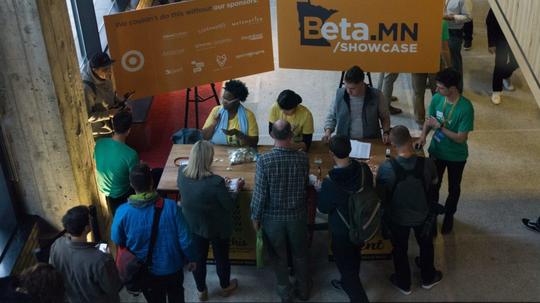
As the executive director and founder of BETA, Reed Robinson knows a thing or two about startup success and failure.
After all, BETA has mentored more than 150 early-stage Minnesota tech companies since it was founded in 2013. The organization also established Twin Cities Startup Week, which recently brought thousands to the Twin Cities in its sixth year.
Robinson's startup experience comes not just from leading BETA, but also stems from his own collection of companies throughout the years.
Robinson joined Heroic as a co-founder in 2012. Established one year prior, the business was building itself into something like Task Rabbit. By the time the company raised cash (around $200,000) and launched its beta product, it had pivoted to an alternative for Angie's List, but with more relevant recommendations.
Heroic shut its doors in 2013. Robinson, the company's chief product officer, spoke with Minne Inno about the company's legacy and how it led to the creation of BETA.
Note: This interview has been lightly edited for length and clarity.
How did you get involved with Heroic?
I joined Heroic as a co-founder a few months after it was formally founded. I got involved because I found myself providing a lot of advice on the pitch, business and strategy to a point where I started to talk myself into the opportunity.
The company that I was working for at the time, Iconoculture, a venture-backed firm, was acquired by a much larger organization, which added an additional incentive to venture out on my own.
What was Heroic's biggest milestone or success?
We got second place in the High Tech division of the MN Cup. But personally, I'm most proud of the launch of our beta product.
A year before shuttering, describe the state of the business.
At that point, the novelty of being in a startup had worn off. We were also at the point where we were realizing that the product we were building wasn't going to work and needed to be scrapped.
If I have the timing down, it was likely a combination of feeling overwhelmed, knowing we needed to essentially start from scratch, mixed with the occasional win in the fundraising process.
What were some early warning signs that things weren't going to work out?
There were a lot of starts and stops. Ideas that became the new strategy would change as frequently as once-a-week. Conversations with "investors" were driving our strategy, instead of conversations with potential customers. Gaps in the team startup to show, but were not always acknowledged or addressed.
Could the end have been avoided? If so, how?
Yes and no. Every company can survive if the founder is willing to grind it out and has the personal capital to sustain themselves as they figure out product-market fit. But we didn't have the right team in place for what we were trying to accomplish. Everyone was highly capable, but every team has gaps. Our problem was that we weren't acknowledging those gaps, and therefore not filling them.
What would you label as the cause of death?
Apathy, as well as over-building and under-selling, as well as a lawsuit. Also no real competitive advantage.
What were your biggest lessons learned from the experience? How did it affect your future ventures?
These lessons are from my own experience, plus seeing what works and doesn't work for the more than 150 companies that have gone through BETA:
- There are no hacks – no shortcuts.
- Sell then build.
- Acknowledge and address gaps in the team as soon as possible. Every team has them.
- You MUST have a competitive advantage, and the only true advantage is relationships.
- Fundraise if you have to.
How did the experience affect you outside the office?
Even though I got kicked in the teeth, I'm very thankful for that experience, and I'd do it again. Working in a startup set me on a new trajectory. I ended up with a better job than what I had, and the experience ultimately led to BETA, which has supported hundreds of other founders within the community.
Emotionally, the one thing I regret from the experience was that I took myself too seriously. I forgot that I chose to do a startup and that I had the power to make it more fun. For those reading this, please remember that you have the ability to make the experience as good (or bad) as you'd like.








